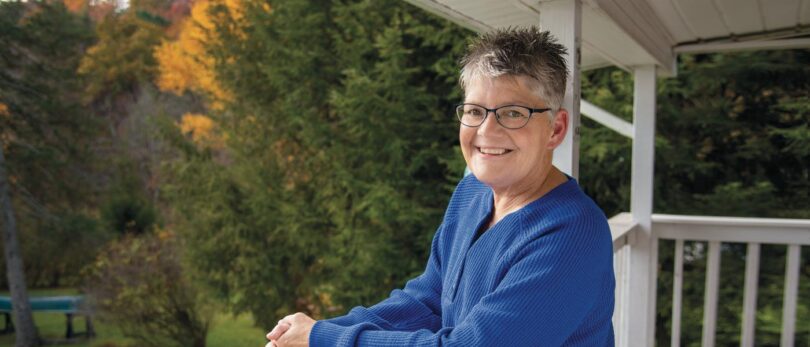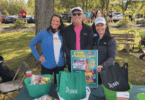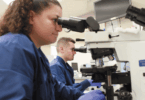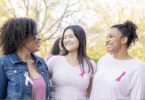UHS nurse navigators help breast cancer patients cope with their treatment and more
What seemed like a routine mammogram for Wendy Barnum, a Southern Tier resident, soon became the diagnosis that changed everything. Throughout her life, she had dense tissue and benign lumps. Ms. Barnum thought to herself: “Here we go again,” as she walked into her appointment. She didn’t expect that to lead to a cancer diagnosis in April 2019, leaving her with a new array of questions and challenges to overcome.
“You hear about breast cancer, but you’d never think: ‘This just happened to me,’” Ms. Barnum said.
The UHS Breast Center strives to be a leading provider of oncology care, ensuring it offers not only a comprehensive program that treats the physical aspect of battling cancer but also a nurse navigator program that assists patients with the mental and emotional toll that comes with a diagnosis and treatment.
“There are a lot of components that go on,” Ms. Barnum said. “You get your mammogram, they give their interpretations, you get your biopsy, and then you get the biopsy results. But the biopsy results take some time. So, from the point of time when I had the biopsy to the discussion about the type of breast cancer, my nurse navigators were instrumental in getting me through the terror of that week.”
Providing reassurance
Getting a cancer diagnosis can be an exhausting experience. During this emotional time, patients can be overwhelmed with advice—sometimes unsolicited—from friends, family and an endless supply of internet resources. UHS Oncology nurse navigators are available to guide patients from diagnosis to post-treatment, helping them follow a plan that’s right for them. They also assist with care coordination, taking notes during appointments and advocating to providers on the patient’s behalf while remaining available to answer any patient questions.
While the UHS Breast Center located at UHS Vestal on the Vestal Parkway provides the greatest number of breast health programs available from UHS, services are also available at:
- UHS Chenango Memorial Hospital: digital mammograms and a breast surgeon; for more information, call 607-337-4111
- UHS Delaware Valley Hospital: digital mammograms; for more information, call 607-865-2126
“I look at it as I’m their friend on the inside,” said Julia Mack, BSN, RN, CBCN, at UHS. “I’m here to relieve some of the stress for them during a very overwhelming time. I advocate for timely appointments, coordinate those appointments and get the balls rolling to start cancer treatment as quickly as possible. I’m well versed in evidence-based breast cancer treatment, so I use my knowledge to help them.”
Ms. Mack said one of the ways nurse navigators stay involved in care is by attending appointments and taking notes to print out for patients following their appointments. This way, patients don’t have to worry about absorbing and understanding all the information right away. They have notes they can look back on to process and can contact a nurse navigator to clarify anything their providers said to them.
Ms. Barnum said at the beginning of her diagnosis, she would play “Dr. Google.” Ms. Mack helped her stay out of that downward spiral by answering questions she would have as a result and urging her to look only at the American Cancer Society’s website if she must insist on going online.
“I was calling them twice a day,” Ms. Barnum said. “I would get off the phone, and I could feel myself crawling out of the rabbit hole I had put myself in. I could not have gotten through that without them. It was a lot of reassurance, but they weren’t just saying, ‘Everything’s going to be fine.’ They gently held my hand through the process.”
UHS nurse navigators are trained to serve not only as a nurse but also an advocate and friend. They offer information and support for all patients with breast care issues while scheduling surgical consultations and relaying information to primary and specialty care providers.
“It’s overwhelming when you hear that you have cancer to start with. There are a lot of different treatment avenues that you’re going to be visiting, most likely. Sometimes, the hardest part is knowing who to call,” Ms. Mack said.
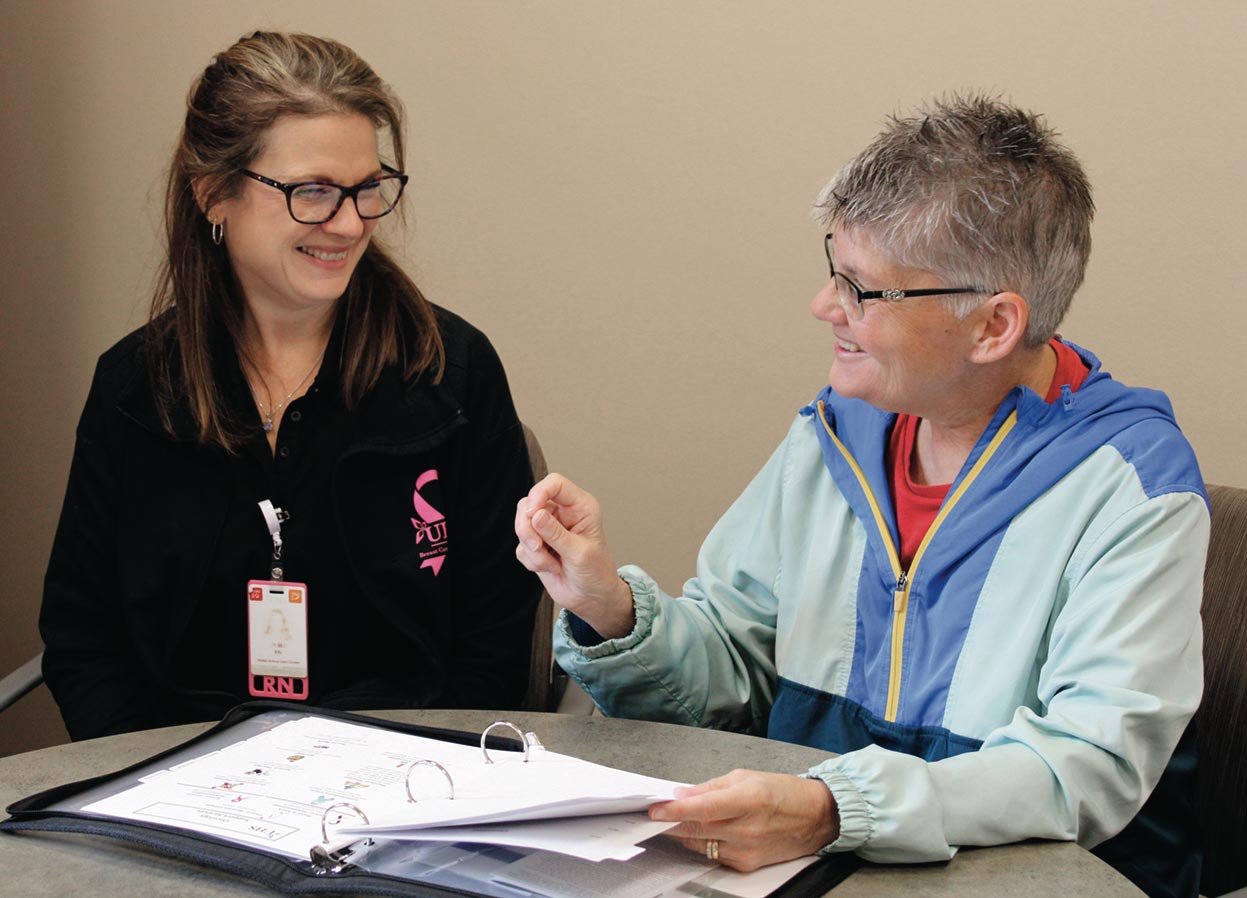
Ms. Julia Mack (left), a nurse navigator at UHS, consults Ms. Barnum on her cancer treatment options.
Bonds that last a lifetime
Today, Ms. Barnum is approaching her fifth year post-surgery and is enjoying time with family and friends. She loves power walking, watching football, dominating at fantasy football and being anywhere near water. She still utilizes support from her nurse navigator team at the UHS Breast Center and goes in twice a year—one visit for a mammogram and another for a clinical exam.
“I love to go in and see them,” Ms. Barnum said. “It sounds strange to say, given a breast cancer diagnosis, but I had a wonderful experience with the UHS Breast Center. I consider these people, these women, my friends.”
Ms. Mack encourages her patients to call their nurse navigator with any questions, no matter how silly it may seem. They understand that patients may feel defeated, confused and bombarded with information, so having someone they can talk to and bond with is important.
“We maintain a relationship sometimes into years after their initial treatment. You build bonds with patients during that scary time, and they last,” Ms. Mack said. “It’s nice to see patients coming back after having completed their treatment and doing well. It’s what keeps me coming to work every day.”
Get Screened
For more information or to schedule a mammogram, visit nyuhs.org/care-treatment/womens-health/breast-health

